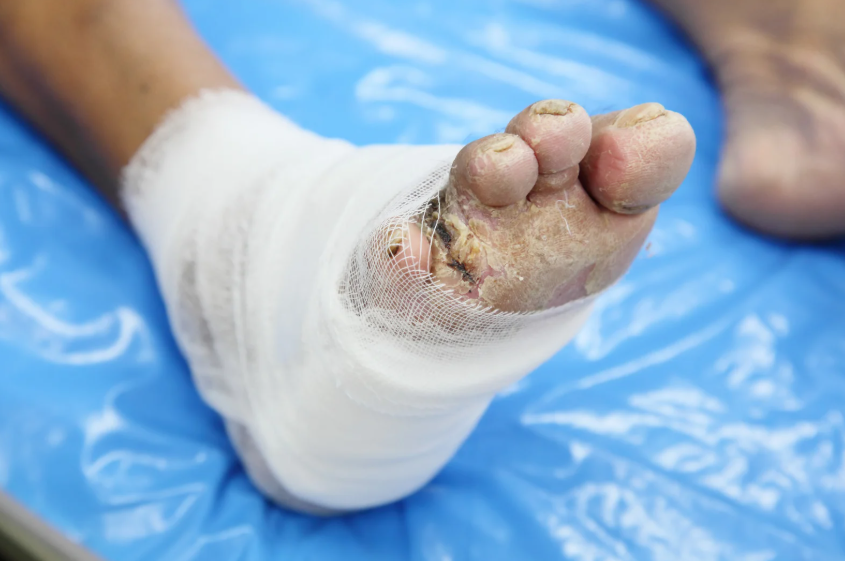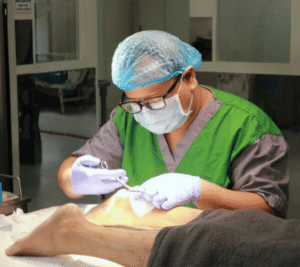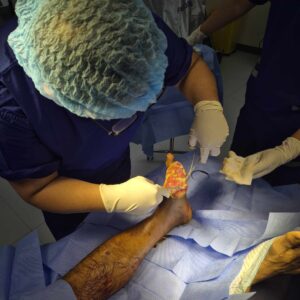Forefoot ulcers are a common and painful condition that affects many individuals, especially those with diabetes. These ulcers often occur due to prolonged pressure on the foot, poor circulation, or nerve damage, leading to open sores that can cause significant discomfort. As one of the most critical aspects of foot care, orthopedic treatment for forefoot ulcers plays a pivotal role in reducing pain and promoting healing. With proper intervention, pain can be managed effectively, and the risk of future complications can be significantly reduced. In this article, we’ll explore how orthopedic treatment for forefoot ulcers can make a difference in the lives of those suffering from this condition, helping them regain their mobility and quality of life.
What Are Forefoot Ulcers and Why Do They Hurt?
Forefoot ulcers are open wounds that typically form on the ball of the foot, the toes, or the bottom of the foot. These ulcers are most commonly caused by the constant pressure of standing or walking, particularly in individuals who have neuropathy due to diabetes. Neuropathy can cause loss of sensation in the feet, meaning a person may not be aware of the constant pressure or friction causing the ulcers. Additionally, poor circulation, improper footwear, or foot deformities can exacerbate the problem.
The pain from forefoot ulcers can vary depending on the severity of the wound. In the early stages, pain may be mild, but if left untreated, the ulcers can become infected, causing significant pain, swelling, and even tissue death. This is where orthopedic treatment for forefoot ulcers becomes essential, as it helps alleviate the pressure on the affected area, reduces the pain, and accelerates healing.
Role of Orthopedic Treatment in Managing Forefoot Ulcers
When it comes to managing forefoot ulcers, orthopedic treatment for forefoot ulcers is often the best course of action. Orthopedic care focuses on providing specialized support to the affected foot, ensuring that the ulcer is protected from further irritation while supporting the healing process. Orthopedic specialists, like those at Tec Orthopedics, take a holistic approach to treatment, combining various strategies to manage pain, promote healing, and prevent the recurrence of ulcers.
The primary goals of orthopedic treatment for forefoot ulcers are to offload pressure from the affected area, ensure proper wound care, and provide long-term protection against future ulcers. By reducing the strain on the ulcerated area, orthopedic treatment for forefoot ulcers helps manage pain and facilitates the body’s natural healing processes.
Pain Reduction Through Pressure Offloading Devices
One of the most effective ways that orthopedic treatment for forefoot ulcers reduces pain is through the use of pressure offloading devices. These devices are designed to redistribute weight away from the ulcerated area, allowing the wound to heal without the added strain of daily pressure from walking or standing. Offloading devices include special shoes, casts, and custom orthotics that can be tailored to a patient’s unique foot structure.
At Tec Orthopedics, patients are provided with orthotics that are specifically designed to alleviate pressure on the forefoot, which is the primary cause of pain in forefoot ulcers. These devices work by redirecting the force that would typically be applied to the ulcer, ensuring that the affected area is given time to heal. Offloading devices are particularly important for individuals with diabetes or other conditions that impair circulation, as they reduce the risk of further complications.
Custom Orthotics: Supporting the Healing Process
Custom orthotics are another crucial component of orthopedic treatment for forefoot ulcers. These specially designed shoe inserts are made to fit the patient’s feet perfectly, providing the right balance of support and cushioning. By addressing the unique pressure points of the foot, custom orthotics ensure that the ulcer is not subjected to unnecessary strain. They also help correct any abnormal foot mechanics that may contribute to the development of ulcers, such as an uneven gait or improper posture.
The role of custom orthotics in orthopedic treatment for forefoot ulcers is essential because they help patients with a range of conditions, including those with diabetic neuropathy, to prevent further ulceration. By wearing well-designed orthotics, patients can reduce pain and prevent the formation of new ulcers, all while maintaining proper foot alignment and mobility.
Choosing the Right Footwear After Treatment
After an ulcer has healed, choosing the right footwear is critical to maintaining foot health and preventing the recurrence of forefoot ulcers. Orthopedic treatment for forefoot ulcers often includes guidance on selecting footwear that provides proper support and reduces the risk of further injury. Medical-grade shoes with a wide toe box, cushioned insoles, and arch support are key to protecting the feet.
Patients should avoid shoes that apply pressure to the ulcerated area or cause friction. Orthopedic specialists, including those at Tec Orthopedics, offer advice on selecting footwear that supports long-term foot health. In some cases, custom-made shoes or orthotic inserts may be recommended to ensure that the feet are properly protected.
Other Supportive Orthopedic Measures for Pain Management
Beyond offloading devices and custom orthotics, there are other supportive orthopedic treatments for forefoot ulcers that can aid in pain management. For example, padding and bracing techniques are often used to protect the ulcerated area from further irritation. Soft padding can reduce friction, while braces can provide additional stability to the foot, making it easier to walk without putting stress on the affected area.
Additionally, supportive bandaging can be employed to keep the ulcer clean and protected, preventing infection and further complications. Tec Orthopedics often integrates these supportive treatments into a comprehensive care plan that includes wound care, pain management, and rehabilitation, ensuring that the patient’s recovery is as smooth as possible.
When Surgery Becomes Necessary
In some cases, orthopedic treatment for forefoot ulcers may not be enough to fully address the issue, especially if the ulcer has become severely infected or has led to deformities in the foot. In such situations, surgical intervention may be required. Surgical options include debridement (removal of dead tissue) or, in extreme cases, reconstructive surgery to correct deformities caused by long-term ulceration.
While surgery is typically a last resort, it can be an effective way to reduce pain and restore foot function. Orthopedic surgeons at Tec Orthopedics are trained in the latest surgical techniques and will work closely with patients to determine the most appropriate treatment plan based on their specific needs.
Long-Term Benefits of Orthopedic Treatment for Forefoot Ulcers
The long-term benefits of orthopedic treatment for forefoot ulcers extend far beyond immediate pain relief. By focusing on prevention and proper care, patients can significantly reduce the risk of developing new ulcers. In many cases, individuals who undergo comprehensive orthopedic treatment for forefoot ulcers experience an improvement in mobility, as they are no longer burdened by the pain of walking or standing for extended periods.
Moreover, regular orthopedic care can help individuals maintain a higher quality of life by allowing them to remain active and independent. The use of custom orthotics, pressure relief devices, and proper footwear can all contribute to reducing the likelihood of ulcer recurrence and ensuring that patients can continue to lead an active lifestyle.
Effective Orthopedic Treatment Can Reduce Forefoot Ulcer Pain
Orthopedic treatment for forefoot ulcers plays a vital role in managing pain and improving mobility for those suffering from this debilitating condition. From custom orthotics and offloading devices to specialized footwear and supportive treatments, there are a wide range of options available to help alleviate pain, promote healing, and prevent future complications. Tec Orthopedics is dedicated to providing patients with comprehensive, personalised care that focuses on both the immediate and long-term needs of the patient. If you or a loved one is dealing with forefoot ulcers, seeking professional orthopedic care can make all the difference in managing pain and ensuring a quicker recovery.






